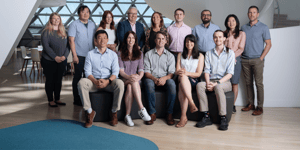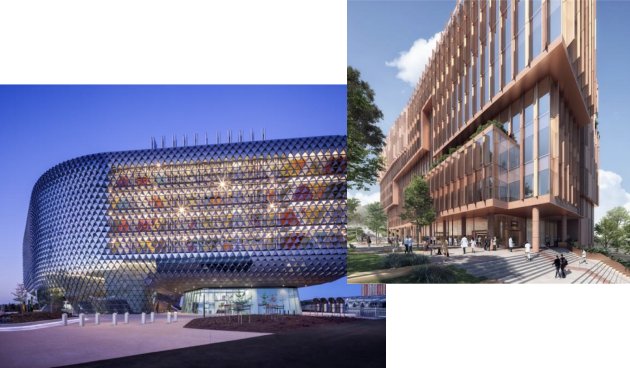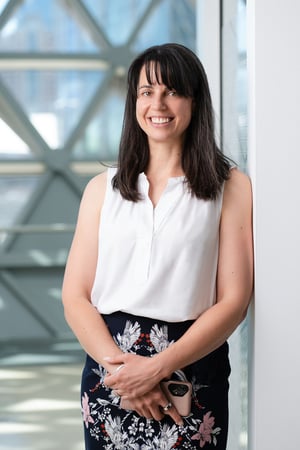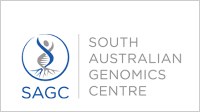
The South Australian Genomics Centre
The South Australian Genomics Centre (SAGC) was established in July 2020 as a State-wide genomics facility to support research in South Australia, as well as nationally and internationally.
- Our Goal
- SAGC Nodes
The SAGC central hub is located in the iconic SAHMRI building in the heart of Adelaide's Biomed City and has additional nodes on the Waite Campus and at Flinders University.

Our Team
Our dedicated team of experienced staff come from a wide variety of research backgrounds and have a wealth of knowledge in all areas of genomic and bioinformatic research including animal, plant, environmental, microbial, ancient DNA and human genomics.
- All
- Management
- Genomics
- Bioinformatics


Munir Iqbal holds a PhD in Plant Molecular Biology from the University of Western Australia. With over 6 years of post-PhD technical experience in various roles in NGS core laboratories, Munir is dedicated professional with a solid foundation in next generation sequencing and a keen understanding of evolving laboratory procedures in Genomics.
His expertise encompasses a range of techniques, including next-generation sequencing (NGS) using various platforms where he played pivotal roles in establishing and optimizing library preparation workflows such as whole-genome, whole-transcriptome, whole-exome, single-cell, spatial transcriptomics and Hifi SMRTbells and supporting researchers in both short-read and long-read sequencing.
Munir’s commitment to excellence extends to mentoring junior team members, developing and implementing innovative technologies in single cell and spatial transcriptomics, and fostering collaborative partnerships within the scientific community.
Caitlin has four years of experience working with diagnostic infectious disease and molecular biology technologies and completed her Honours degree in Laboratory Medicine from the University of South Australia. As a next generation sequencing specialist, she is experienced in performing high throughput sample processing and library preparation using both Illumina and Oxford Nanopore sequencing platforms.
He holds a Bachelor of Science in Bioinformatics from the University of Queensland and a Doctor of Philosophy in Genomics from Queensland University of Technology, where his research focused on Australian Indigenous genomes. He has published widely in peer-reviewed journals and presented his work at major conferences.
His key technical proficiencies include Python, R, Bash, and HPC systems, along with practical experience in data visualization tools such as ggplot and Circos. As a driven scientist, he is committed to advancing genomic research, particularly in underrepresented populations. He currently serves as a bioinformatician at the South Australian Genomics Centre (SAGC), applying his expertise to support innovative genomics projects.
Sarah’s academic research focused on the genomes of gut parasites and coral symbionts, with an emphasis on microbial eukaryote evolution. She later worked at Microba, a gut health diagnostics company, where she gained valuable DevOps experience. Sarah has hands-on expertise with a range of sequencing platforms, including Illumina, PacBio, and Nanopore. She has now joined SAGC as a bioinformatician, where she works on compute architecture and pipeline development. Sarah has a particular fondness for challenging genomes—such as those of dinoflagellate algae—and enjoys pushing the limits of bioinformatics tools.
Olivia is a recent graduate of Monash University where she completed a Master of Genome Analytics. She has experience in both germline and somatic (cancer) variant curation as well as cytogenetic copy number variant curation. With a broad knowledge of bioinformatic pipelines, sequencing technologies and hands-on experience using Oxford Nanopore platforms, she is passionate about rare disease research and the translation of genomics into improved health outcomes.
Tod has nearly 30 years of experience in molecular genetics and epigenetics from 7 different laboratories that encompass academic research, industry, clinical genetic testing, and core facility service provision. He holds a PhD from the University of Adelaide in Human Neurogenetics and has authored/co-authored 42 scientific publications to date.
Tod gained this hands-on experience by using molecular genetic/epigenetic and genomic techniques in clinical testing, research, and industry settings – with more than 9 years from commercial NGS laboratories operating under NATA accreditation. This experience includes gaining, maintaining, and expanding the scope of NATA accreditations. He believes that quality control is a central tenet of a high-quality service.


Tod has nearly 30 years of experience in molecular genetics and epigenetics from 7 different laboratories that encompass academic research, industry, clinical genetic testing, and core facility service provision. He holds a PhD from the University of Adelaide in Human Neurogenetics and has authored/co-authored 42 scientific publications to date.
Tod gained this hands-on experience by using molecular genetic/epigenetic and genomic techniques in clinical testing, research, and industry settings – with more than 9 years from commercial NGS laboratories operating under NATA accreditation. This experience includes gaining, maintaining, and expanding the scope of NATA accreditations. He believes that quality control is a central tenet of a high-quality service.
.png?width=300&name=Tod%20Fulston%20(2).png)
Human Genetic/Genomic variation, Epigenetic Inheritance, sncRNAs, Long-Read Sequencing, Automation, NATA accreditation, Quality Control
PublicationsMunir Iqbal holds a PhD in Plant Molecular Biology from the University of Western Australia. With over 6 years of post-PhD technical experience in various roles in NGS core laboratories, Munir is dedicated professional with a solid foundation in next generation sequencing and a keen understanding of evolving laboratory procedures in Genomics.
His expertise encompasses a range of techniques, including next-generation sequencing (NGS) using various platforms where he played pivotal roles in establishing and optimizing library preparation workflows such as whole-genome, whole-transcriptome, whole-exome, single-cell, spatial transcriptomics and Hifi SMRTbells and supporting researchers in both short-read and long-read sequencing.
Munir’s commitment to excellence extends to mentoring junior team members, developing and implementing innovative technologies in single cell and spatial transcriptomics, and fostering collaborative partnerships within the scientific community.
Caitlin has four years of experience working with diagnostic infectious disease and molecular biology technologies and completed her Honours degree in Laboratory Medicine from the University of South Australia. As a next generation sequencing specialist, she is experienced in performing high throughput sample processing and library preparation using both Illumina and Oxford Nanopore sequencing platforms.
Simon is a skilled bioinformatician and genomics scientist with expertise in next-generation sequencing (NGS) data, variant calling, and genome assembly. With a strong focus on Indigenous population genomics and chronic disease research, he has contributed to groundbreaking work on mapping genetic variants linked to chronic kidney disease and developing bioinformatics tools for data analysis.
He holds a Bachelor of Science in Bioinformatics from the University of Queensland and a Doctor of Philosophy in Genomics from Queensland University of Technology, where his research focused on Australian Indigenous genomes. He has published widely in peer-reviewed journals and presented his work at major conferences.
His key technical proficiencies include Python, R, Bash, and HPC systems, along with practical experience in data visualization tools such as ggplot and Circos. As a driven scientist, he is committed to advancing genomic research, particularly in underrepresented populations. He currently serves as a bioinformatician at the South Australian Genomics Centre (SAGC), applying his expertise to support innovative genomics projects.
Sarah’s academic research focused on the genomes of gut parasites and coral symbionts, with an emphasis on microbial eukaryote evolution. She later worked at Microba, a gut health diagnostics company, where she gained valuable DevOps experience. Sarah has hands-on expertise with a range of sequencing platforms, including Illumina, PacBio, and Nanopore. She has now joined SAGC as a bioinformatician, where she works on compute architecture and pipeline development. Sarah has a particular fondness for challenging genomes—such as those of dinoflagellate algae—and enjoys pushing the limits of bioinformatics tools.











